UK Parliament advances bills to bring equal marriage to Northern Ireland
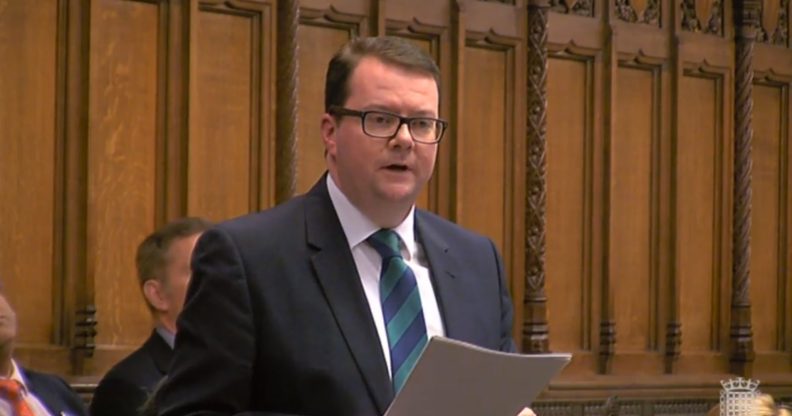
Labour MP Conor McGinn
Two former Conservative equalities ministers have given their backing to a bill that would bring equal marriage to Northern Ireland, as it passed its first reading.
Northern Ireland is currently the only part of the UK that continues to ban same-sex marriage, due to opposition from the ultra-conservative Democratic Unionist Party.
Following the collapse of Northern Ireland’s devolved power-sharing government, campaigners on the region have said that responsibility for bringing about equal marriage now lies with the UK Parliament.
Today Northern Ireland-born Labour MP Conor McGinn introduced a Ten Minute Rule bill on the floor of the House of Commons – and it passed a first reading without a division, with no MPs rising up to force the issue to a formal vote.
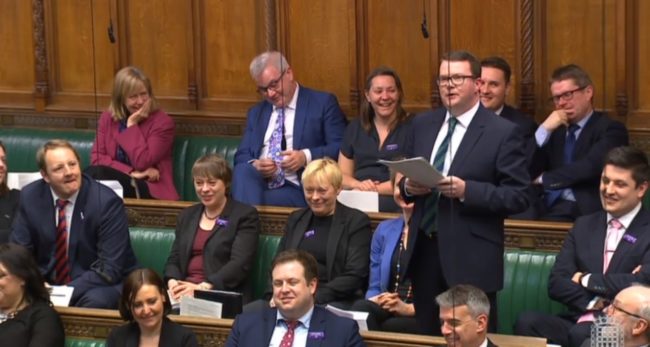
Although Ten Minute Rule bills do not frequently become law, it is hoped that the broad base of support for the legislation could help turn the bill into reality.
The bill’s sponsors have a broad base of experience on the issue – including former equalities ministers Nicky Morgan and Justine Greening, former Shadow Home Secretary Yvette Cooper, former Shadow Northern Ireland Secretary Owen Smith, backbench Labour MPs Wes Streeting, Ged Killen, Karin Smyth and Angela Eagle, Lib Dem MP Layla Moran, Green MP Caroline Lucas, and Tory MP Nick Herbert.
Northern Ireland Secretary of State Karen Bradley has said the Government will allow a free vote on the bill as a “matter of conscience”.
But Prime Minister Theresa May emphasised in Parliament today that she would rather the issue was dealt with by the Northern Ireland Assembly.
She said: “I hope the Hon. Gentleman will recognise the record that this government has in relation to LGBT rights, because this is an issue we have taken up and we have championed.
“I think the Hon. Gentleman will find that it is previous legislation, under the last Labour government, that ensured this was a devolved matter. We hope that there will be a Northern Ireland Executive in place soon that will be able to address these issues.”
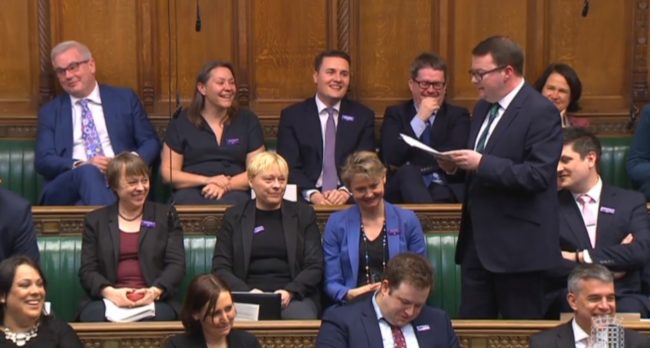
In his speech, Mr McGinn called out the remaining inequality in the region and urged the government to ensure that gay couples are able to marry in the absence of a devolved Assembly.
He said: “I speak with great pride in the people on whose behalf I bring forward this bill, but with reluctance too, and some disappointment, for two reasons.
“Firstly, because this measure is long overdue. Northern Ireland is the anomaly on these islands when it comes to LGBT rights. People in London, Dublin, Cardiff and Edinburgh can all get married to the person they love, but same-sex couples are denied that basic right in Northern Ireland. That is a wrong that must finally be corrected.
“Secondly, because this measure should be enacted in the Northern Ireland Assembly. That is my strong preference, and I know across the House, members want the power-sharing institutions restored at Stormont. But the Assembly being in cold storage shouldn’t mean that Northern Ireland remains a cold house for LGBT rights.
“The de facto suspension of the devolved legislature does not mean that equality for same-sex couples can be suspended indefinitely, because rights delayed are rights denied. It is for those reasons that members right across the House and the Love Equality campaign are demanding that this house, this Parliament and this government acts.
“We can derive a legitimate mandate to do so on this particular issue because the people of Northern Ireland and their elected representatives in Stormont have spoken in favour of same-sex marriage.
“In November 2015 the Assembly voted in favour of a same-sex marriage bill, and every poll of the public has shown broad support of 60 to 70 percent in favour. Alongside this, the majority of parties support this. They contend that change is needed and that in the absence of the Assembly, Westminster must act. This is not about people being nationalist or unionist, or being gay or being married – it’s about people being equal.
“In bringing this bill, we seek not to usurp the democratic institutions in Northern Ireland, but to support them. There are those who oppose equal marriage and do not wish to see it extended to Northern Ireland. It is their right to hold those opinions, but it is not their right to deny, block or denigrate the rights of others.”
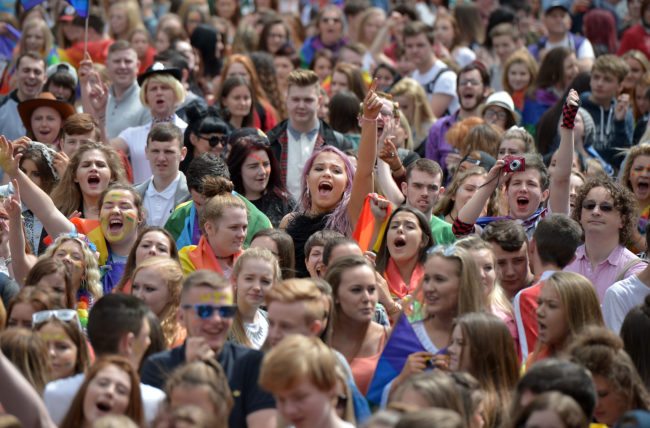
A parallel bill in the House of Lords also passed its first reading vote.
Layla Moran said: “Delivering same-sex marriage in England is one of the proudest achievements of the Liberal Democrats’ time in coalition government – but sadly many couples in Northern Ireland are not allowed to marry the person they love.
“I’d much rather that this decision was taken by local politicians in Belfast, but given that it doesn’t seem the Assembly will be up and running again soon, I believe that Westminster MPs are right to change the law to provide marriage equality for everyone.
“It is a real honour and a privilege to be sponsoring this legislation. I hope that all parties will now support it and make sure it becomes law as quickly as possible so that everyone, in all parts of the United Kingdom, no matter where they live or who they love, can get married.”
In an interview with PinkNews in Westminster this week, the leader of Sinn Féin in Northern Ireland Michelle O’Neill gave her backing to the move – even though, as republicans, Sinn Féin do not typically recognise the authority of the UK Parliament over Northern Ireland.
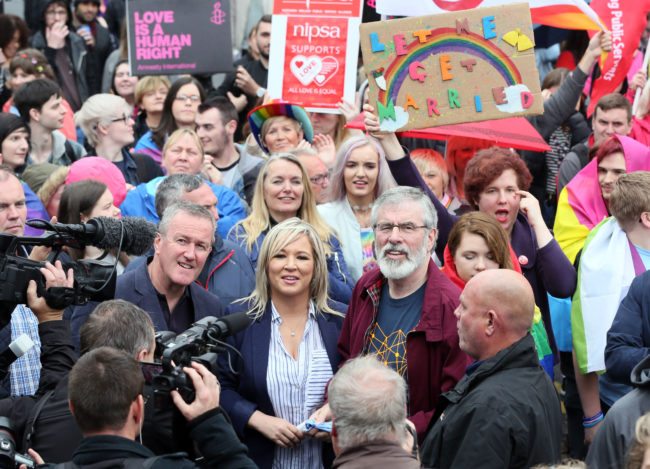
Sinn Fein President Gerry Adams (R) and Northern Leader Michelle O’Neill join gay rights campaigners in a march through Belfast on July 1, 2017 to protest against the ban on same-sex marriage. (Photo by PAUL FAITH/AFP/Getty Images)
Ms O’Neill told PinkNews: “We have no government in the North at the moment, we haven’t had for 14 months, and one of the issues that’s right at the heart of the political impasse is the fact that we weren’t able to secure marriage equality in the Assembly despite quite a number of attempts.
“I was very clear throughout the [recent power-sharing] negotiations that if I wasn’t able to secure it as a deal with the DUP, we would go an alternative route.”

